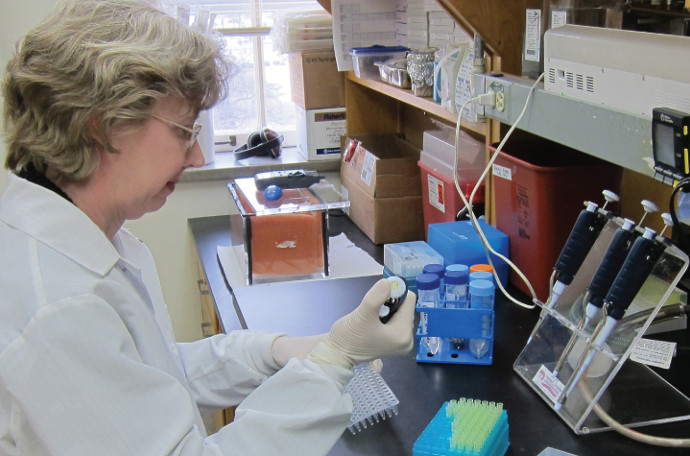Ab-Mediated Translation in Fragile X Syndrome

Cara Westmark PhD
Principal Investigator
University of Wisconsin
Madison, WI
2011-2012 Grant Funding: $120,000
Summary
Dr. Cara Westmark at the University of Wisconsin explored the role of APP as a potential treatment option for Fragile X. APP produces b-amyloid which is over-expressed in Alzheimer’s disease (AD) and Down syndrome.
The Results
Dr. Westmark explored the therapeutic potential of beta-secretase (BACE-1) inhibitors in the treatment of Fragile X. BACE-1 inhibitors are under preclinical and clinical evaluation for the reduction of beta-amyloid levels in Alzheimer’s disease. Beta-amyloid is a proteolytic fragment derived from secretase processing of amyloid precursor protein (APP). Her previous work demonstrated that APP mRNA was a translational target regulated by FMRP and mGluR5, and that APP and beta-amyloid levels were elevated in Fmr1KO mice.
Consistent with these findings, her 2008-2010 FRAXA-funded work demonstrated that several Fragile X phenotypes can be rescued by genetically reducing APP and beta-amyloid levels in Fmr1KO mice, and that beta-amyloid is a potential blood-based biomarker for Fragile X. These studies were conducted in collaboration with several other FRAXA-funded investigators including, Drs. Elizabeth Berry-Kravis, Jim Malter, Bob Wong, Kim Huber and Jay Gibson. Overall, these findings strongly support the hypothesis that APP and beta-amyloid are key LTD proteins that contribute to Fragile X pathology, and that therapeutics currently under study for the modulation of APP processing and beta-amyloid levels in Alzheimer’s disease may be applicable to Fragile X.
Her 2011-2013 FRAXA-funded work examined the role beta-amyloid in synaptic translation, and the rescue of Fragile X phenotypes with BACE-1 inhibitors. Her laboratory has demonstrated rescue of audiogenic-induced seizures in Fmr1KO mice as well as rescue of dendritic APP expression in cultured neurons in response to BACE-1 inhibition.
A comparison of the Alzheimer’s disease and Fragile X literature demonstrates that many of the identified receptor and signaling molecules with established roles in Fragile X are regulated by APP and/or beta-amyloid. In addition, several drugs in clinical trials for Fragile X have on- or off-site activities that modulate APP, beta-amyloid and/or BACE-1 including a clinical trial with acamprosate in Fragile X by Dr. Craig Erickson (Univ. IN).
A paper by Dr. Westmark in collaboration with FRAXA-funded investigators Dr. Elizabeth Berry-Kravis (Rush University Medical Center) and Dr. Jerry Yin (Univ. WI-Madison) along with Drs. Luigi Puglielli and Chris Ikonomidou (Univ. WI-Madison) explores the potential of BACE-1 inhibitors for the treatment of Fragile X (Frontiers Cellular Neuroscience, 2013). APP and beta-amyloid may be valuable therapeutic targets for Fragile X as well as blood-based biomarkers for clinical trials.

